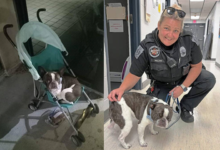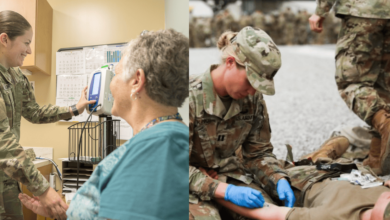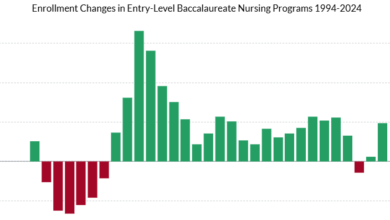Nurse-led scheme helping refugees gain NMC registration

A nurse-led programme in the north of England is advocating for and mentoring refugees, to support them to gain nursing registration and start working in the NHS.
The ReSTORE programme supports refugees in South Yorkshire, who had a background in nursing in their home country, to join the Nursing and Midwifery Council (NMC) register.
“These are talented nurses who have so much wealth of experience”
Blerta Ilazi
Established in 2023, the programme is currently in its pilot year.
It is being run through the South Yorkshire Primary Care Workforce and Training Hub and is funded through the NHS South Yorkshire Integrated Care Board (ICB).
ReSTORE is led by two clinical nurse educators, Blerta Ilazi and Emma Matthews, who volunteer their time to support refugee nurses alongside their day jobs.
Ms Ilazi, who is an advanced nurse practitioner, told Nursing Times about ReSTORE’s success and how she hoped the programme would continue to grow.
ReSTORE stands for refugee support, training, orientation, recruitment and education.
The programme offers refugee nurses support with English language exams and clinical exams such as the computer-based test (CBT) and the objective structured clinical examination (OSCE).
In addition, it offers wider pastoral support to help them integrate into life in the UK.
ReSTORE works closely with local organisations that support refugees, the Department of Work and Pensions and job centres, which all refer refugees to the programme.
Currently, the programme has two cohorts of people it is supporting to gain NMC registration, from countries like Albania, Pakistan, Somalia, Ethiopia, Ukraine and Iran.
Ms Ilazi, who arrived in the UK 25 years ago as a refugee, set up the programme because she had witnessed first-hand some of the barriers that these nurses face when trying to get registration.
She said: “I knew the challenges and the barriers that these nurses face in their efforts to try and return to the nursing career that they had in their home countries.
“These are talented nurses who have so much wealth of experience, and so much knowledge, and they haven’t been able to use it because the employment system can be so rigid and so difficult for them to follow.”
Factors such as waiting for a Home Office decision on their refugee status, lack of English proficiency and having family and childcare needs had prevented many of these nurses from trying to gain registration on their own.
Ms Ilazi said: “Supporting a refugee nurse is completely different to an economic migrant, to a nurse who has chosen to come to England for an employment purpose and has come in a structured arrangement by the NHS in order to fulfil vacancies.
“Refugee nurses have not had this structured support.”
Ms Ilazi explained that one of the greatest challenges for refugee nurses was meeting the NMC’s English language requirements.
As such, ReSTORE offers a 20-week English language preparation course for its members, which is supported by an external provider.
At the time of writing, the first cohort of ReSTORE nurses were preparing to sit their English language exams, and some of them had already passed their CBT.
Alongside this support, Ms Ilazi and Ms Matthews have liaised with hospitals in the South Yorkshire region to offer the refugees employment as healthcare support workers.
Ms Ilazi said this opportunity “allows them to work closely with nurses and helps the hospital to see their progression”.
Meanwhile, ReSTORE also offers a listening ear for any concerns that a refugee nurse may have as they continue to adapt to living in the UK.
The programme has supported refugees with things such as childcare arrangements, immigration forms and housing.

Blerta Ilazi
Ms Ilazi said: “We act as a mentor, we offer psychosocial support [and] we offer advice.
“And most importantly is we are their advocate, we talk on their behalf [and] we really are their voice.”
As the NHS continues to grapple with its shortage of registered nurses, Ms Ilazi argued that it made “economic sense” to seek out refugee nurses and support them to join the NHS.
She said: “Refugees have not chosen to be here, but once they are here they are the most resilient, hard-working individuals who will be very loyal to the job that they are given.
“They have been given a second chance in life, and they will work towards that.”
Alongside the two cohorts that are currently being supported, ReSTORE has a waiting list of people to join the programme.
For this reason, Ms Ilazi and her colleagues are hoping to secure funding to keep the programme running beyond its pilot year.
Meanwhile, other ICBs have been looking to South Yorkshire to see how they could implement a similar programme of support for refugee nurses.
“We have been invited to other ICBs in the country and other organisations to share the best practice examples of how local funding can make a difference to local people,” explained Ms Ilazi.
She urged other NHS organisations to look at the success of ReSTORE and think about whether they could “expand and replicate” the programme in their own area.
“The advice I would give to the ICB would be to look at ReSTORE [and] what amazing work we are doing to help the refugee nurses living in South Yorkshire,” she said.






